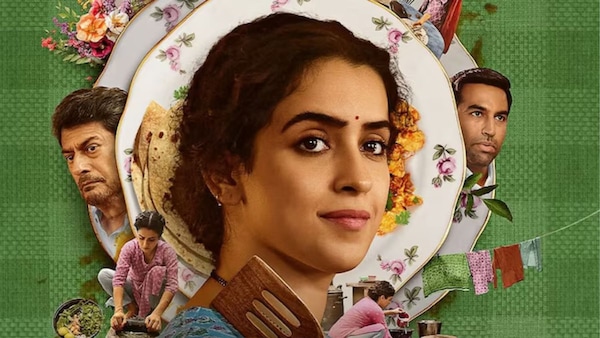Sanya Malhotra’s Mrs. bleeds patriarchal system but are we listening?
Mrs. starring Sanya Malhotra highlights the struggles of a newly married woman, Richa, whose dreams and aspirations are crushed as she becomes entangled in the patriarchal system.

Sanya Malhotra in and as Mrs./ZEE5
Last Updated: 02.42 PM, Feb 20, 2025
ZEE5’s latest family drama film, Mrs., starring Sanya Malhotra, is making waves on social media for its hard-hitting portrayal of the Indian household. Its emotionally charged narrative and the key themes around marriage and gender bias in Indian society have sparked several debates. While a major portion advocates in favour of the many women who face gender bias under the pretext of marital compromise, some men’s rights organisations are now asking for a ban on the movie.
Recently, the SIFF (Save Indian Family Foundation) called for a ban on Arati Kadav’s film for the harsh portrayal of men and the violation of gender equality. But the point is whether Mrs. really is all about ‘feminist propaganda’. Let’s delve deeper into the storyline that has stirred conversations all over India with a key focus on 'Men vs. Women.'
Mrs. plot
Sanya Malhotra, who has featured in Dangal, Meenakshi Sundareshwar, Kathal, Pagglait, and others, plays the eponymous role in this family drama film. The plot, as the name highlights, revolves around a newly married woman whose dreams and aspirations shatter after she is limited to just looking after the house. Despite her best efforts, Richa (Sanya's character) fails to adjust to the 'abnormal' norms.
Patriarchy and Indian arrange marriage system
There are many instances in the film that captivate the essence of a struggling housemaker. Richa grapples with the basic aspects like self-worth, mutual respect, and gender equality, but the saddest part is that nobody is willing to see the loopholes in the system. Whenever we see a moving film like Mrs., there are conversations that shed light on the types of domestic violence or mental trauma, but the patriarchal family system remains rigid and unwavering to change.
I remember sitting in a crowded metro in Delhi when one of the aunties was talking about her daughter-in-law. She was furious at her audacity to stand up for her rights and was trying to justify the injustice as the 'Aajkal ki ladkiyo ka dimag kharab ho gya hai kyuki chand pese kamati hai' (Today's girls have lost their brains because of the few coins they earn). So, if you're trying to speak against any kind of injustice and going against gender stereotypes, you are labeled as an 'unruly or disrespectful brat.'
A close friend of mine (Esha), who works at a hospital in Delhi, shared her devastating marriage journey and how each instance resonated with her. From the Silbatta ki chutney to the job blunder, the movie held a mirror to her difficult marriage. When I shared how men's organisations are now calling for the ban on the film, she had a wonderful suggestion to showcase the reality of Indian households' gender equality with a 'role reversal' approach.
"A boy should also stay at a girl's house to experience the whole thing because when you go through the same situation, you will understand that if some movie is released, it is not always the black and white POV or the right or wrong POV; sometimes it is also the unseen but prevalent grey POV. A man can be non-violent but still toxic," says Esha.
Another friend of mine (name hidden due to personal choice) expressed her concerns over getting married to the right guy. Her parents are arranging a potential match for her. The last guy she met had a weird obsession with her wife 'waking up earlier than him' even on weekends and doing all his chores in the morning. It is yet another tedious debate over who made the rules for the women to wake up early and serve her husband. Isn't marriage all about companionship and mutual respect? It is high time that we delved deeper into our flawed system.
So how do we measure this toxicity? Is there any yardstick to determine how toxicity influences the other half in a marriage? There are many questions that linger in the darkness of our society. Mrs. offers to show us the mirror for most of the households, but still people are choosing to drift from the tough reality on the pretext of stereotypes, feminism, and propaganda against one gender. In India, more than 4.7 lakh domestic cases remain pending in the country under the Domestic Violence Act, as per the Supreme Court. The justice system also stated that a support system for women still needs a lot of work and progress. So, given Mrs.’ focus on core feminism, getting irked with its plot is nothing more than the sheer evidence of the male chauvinism and gender bias.
(Views are personal.)

 Premium
Premium